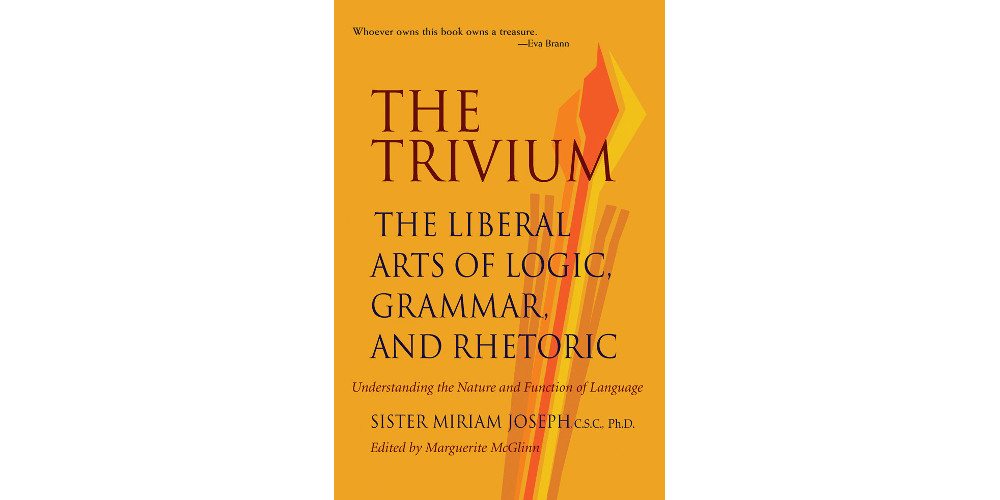
What do you think of when I say “logic” or “grammar”? How about “rhetoric” or “syllogism”? Unless you’ve had a decent liberal arts education, you may be a little lost on the second two, and your definitions of the first two will vary. Though if you’re a classical homeschooling family, this is likely all familiar to you.
Written by Sister Miriam Joseph and edited by Marguerite McGlinn, The Trivium: The Liberal Arts of Logic, Grammar, and Rhetoric is a classic and important work. If you want to go through life making words do your bidding, this is a valuable place to start. If you didn’t learn these topics and skills in school, it’s never too late to teach yourself.
While this particular book was published in this century, Sister Miriam Joseph‘s original writings were published back in 1937. Of course, classical education isn’t anything new. Its roots are in teachings ancient and medieval. But Sister Joseph pulled it all together for us.
The book is broken up into chapters that each deal with a distinct subject that also integrates with the others. The first three chapters deal with language. The next several deal with logic. Then comes induction and literature/rhetoric. The editor has done a marvelous job of making the content easier to work through than the original, changing only what was necessary for clarity and understanding.
The utilitarian or servile arts enable one to be a servant–of another person, of the state, of a corporation, or of a business–and to earn a living. The liberal arts, in contrast, teach one how to live; they train the faculties and bring them to perfection; they enable a person to rise above his material environment to live an intellectual, a rational, and therefore a free life in gaining truth. –Sister Miriam Joseph
Educators, learners, and philosophers used to organize knowledge and education a bit differently from how we do it today. There are seven liberal arts, organized as follows (adapted from The Trivium):
The Trivium – Arts of language pertaining to the mind
Logic
Grammar
Rhetoric
The Quadrivium – Arts of quantity pertaining to matter
Discrete quantity:
Arithmetic
Music
Continuous quantity:
Geometry
Astronomy
This is not a quick-read book. The ideas and information are packed in pretty densely. You’ll want to slowly digest the information inside. This is great to do as an adult, self-teaching to fill in plenty of the holes you were left with from school. Or, integrate it into your children’s education, whether you homeschool or not. It’s never too early to start learning to think for yourself, integrating your knowledge into all of your other knowledge. Learn how to observe, analyze, and understand the world around you. Find patterns. Use language as a tool.
The ideas in this book are demonstrated through many linguistic illustrations and examples and then explained in more direct paragraph form. You’ll find the form and function of language, conventional grammar, propositions (logic and deduction using grammar, basically), fallacies (such as ad hominem and begging the question), induction, story and form analysis, and more. This is a meaty text. Take your time.
Some chapters include a series of exercises to test your knowledge on what you’ve just learned. The exercises are made up of quotations from literary works, such as Shakespeare, Plato, and John Stuart Mill. There are no answers in the back. Not even for the odd ones. So you may want to compare notes with someone.
The Trivium is a very well edited book that can be your guide to learn about the Trivium–logic, grammar, and rhetoric. It’s one of those books for filling in the holes in your own education, and for using with your kids to make theirs more complete as well. But even if you aren’t looking to add liberal arts into your life, merely flipping through this title shows you many interesting examples of the English language that will make you look at the language in a whole new way. Reading through each chapter slowly, in order, however, will give you a better idea of what it’s about. You’ll soon be thinking more critically about the words that surround you.
Note: A copy of the book was provided for review purposes.



I love such articles! Self-education is very important because thanks to him we become better as people, specialists, and interlocutors. Therefore, I want to advise you on the site https://phdessay.com/free-essays-on/america/ for affordable self-education which you can use as you like.
Percebe-se que o autor se esforçou muito neste artigo e sou grato a ele por isso. É claro que a auto-educação é muito importante, todos devem fazê-lo, e o restante pode ser tratado usando o site https://comprartcc.com.br/preco-de-artigo-cientifico/ onde são apresentados os melhores serviços de redação. Sei que muitos estudantes precisam desses serviços, portanto, fico feliz em compartilhar informações úteis.